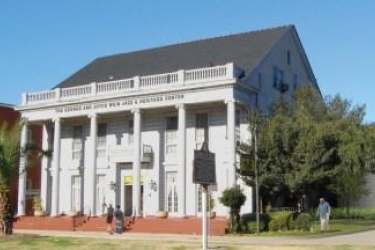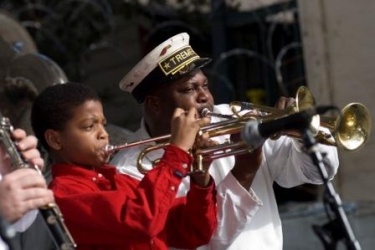
Scott Aiges (Photo: linkedin)
Everyone knows about the New Orleans Jazz and Heritage Festival, but you may not know so much about its nonprofit arm, The New Orleans Jazz and Heritage Foundation, which has been around just as long. The foundation is dedicated to promoting all facets of our musical heritage and culture from African drumming to Zydeco. I recently talked to Scott Aiges, Director of Programs, Marketing and Communications, about the current state of New Orleans music and what the foundation is doing to promote and preserve it.
Most people think of jazz as the single type of original New Orleans music, and it’s certainly important. But it’s not all that we’re about. So what are some of the elements of the local music scene being created here today that excites you?
Well, you know, there is a debate within jazz circles about whether jazz needs to be something specific or is there an all-encompassing definition of what jazz is and incorporates every style of music known to the human race, and that is what makes jazz so exciting and an original. I tend a little bit more toward the latter. And New Orleans itself is very much like that and always has been. New Orleans being a port city, it was always a very famous shipping hub, it embraced so many different styles of music and cultures from around the world, so the music scene that has grown up here over the generations also reflects that diversity. I think the music scene that we have here in town today is every bit as diverse as it always has been, and it’s very exciting. There’s lots of great music being made here.
There are a lot of veterans who are on the scene who are doing great, there are a lot of young people who are coming along who are making really interesting music, there are new clubs opening, there are new venues happening, there’re even new promotors on the scene who are doing interesting work from a concern perspective standpoint. I think we’re in a good solid moving forward position right now as far as music in town.
That was one of the things I was wondered about: Does the music evolve? And you’re saying that it definitely does, whether it’s jazz or R&B or blues or whatever.
Absolutely. There are musicians who are doing very interesting work in things that do not necessarily fit a text book definition of jazz. I mean, you do have a stalwart traditionalist like Leroy Jones or Dr. Michael White or Greg Stafford or Preservation Hall Jazz Band even, that are going around the world doing cool things. But then you have other musicians who are pushing at boundaries in very exciting ways. I think of Aurora Nealand, the incredible saxophone player; she might be doing a Sydney Bechet tribute one night or playing with her own tra-Jazz band, The Royal Roses, the next night, but then she might be out on Frenchman Street doing some bizarre performance art or fronting this incredible rock band that plays festivals all over the place, so she is kind of pushing at boundaries. I mean, even Shamarr Allen the trumpet player, son of the Treme, obviously very deeply rooted in the tradition, he still plays with groups like the Treme Brass Band on occasion, but he is out on the road in Colorado playing big amphitheaters with Galactic, which is a funk rock band, or he makes these awesome YouTube videos of himself jamming along with DJ tracks of hip pop songs. So you know, he’s a jazz musician but he’s not held back by the confounds of jazz and I think you could say that about a lot of musicians. People are
Historically, music was passed down through a lot of the same families, sometimes through the same schools they attended. In a more global community, the kinds of influences you are talking about are varied and wide. So is that a good thing that all of these different strands start weaving a new tapestry?
I personally think that all of these different strands of music weaving a new tapestry, as you say, is a beautiful thing, and I am one who appreciates that and I always enjoy it when I see creative people going off in new directions. But the other point is this notion of the oral tradition and music being passed from one generation to another on the proverbial front stoop, which is how we think of this music being passed down.
And it’s true that society is just a different place today than it was 50 or 75 or 100 years ago. We just live in a different world and we can choose to lament that or we can choose to deal with it. Evan Christopher, the clarinet player was talking [t me] about this issue of the disappearance of the oral traditional and the way music has traditionally been passed down, I guess stereotypical father to son, now not so much necessarily all male, and many people over the years have lamented the disappearance of this particular phenomenon in our culture. And then just a few days later on Facebook I saw a picture that was posted by a musician who had a picture of his 4-year-old son sitting on the knee of a drummer and talking about how the elder is teaching to the younger.
So it may not necessarily happen so much front stoop, but I think there are lots of indications that the information is still being communicated in one way or another — differently perhaps. A lot of the fundamentals have changed, but there are still lots of great people doing lots of great work. I mean, there are a dozen people whose name I could call right now who all have their own nonprofits doing music instruction: Shamarr Allen is one of them, Sunpie Barnes is another, Delfeayo Marsalis, Irvin Mayfield, The Roots of Music is a big one, the Trombone Shorty Foundation. We at the Jazz and Heritage Foundation have our own programming. Everybody is struggling in one way or another, but they are all striving towards the same thing, which is to make sure that our young people are enriched with this great art form that we all love.

The new George and Joyce Wein Jazz and Heritage Center (Photo: New Orleans Jazz and Heritage Foundation)
You have a fairly new center on Rampart Street where you have classrooms. Tell us a little bit about what goes on there.
So the building that you’re talking about is called the George and Joyce Wein Jazz and Heritage Center, and it’s the first ever permanent home of our own music education program, which is called the Don Jamison Heritage School of music. We reach about 100 students a week. We teach them with free music classes that employ eight or nine of some of the city’s top Jazz musicians as instructors. It’s also the place where we do lots of free workshops for the community. We do free African drumming workshops, Marti Gras Indian bead workshops. We do song writing workshops for teenagers with PJ Morton, the Grammy winning record producer, and we also host free concerts pretty much once a month, community events, music industry conferences. It’s a $9 million facility with state-of-the-art technology and it’s our way of providing an education and community center for the region.
I also understand that with Cuba opening up and the Latin population here that’s so strong, you have incorporated some of that interest into your programming.
Well, there is a lot of great interest in Latin music these days in New Orleans and especially now with Cuba beginning to open up,, there’s lots of great music going on.
I should point out that there’s a club in the St. Bernard neighborhood called Prime Example, that on Thursday nights has wonderful Latin and jazz concerts that Ariana Hall with the Cubanola Collective puts on. We also are very keenly interested, so we actually have a couple of Cuban-themed concerts coming up. We’re doing kind of a miniseries of Cuban piano players. So on September 24 there’s a wonderful Cuban piano player named Roberto Fonseca who is associated with the Buena Vista Social Club and he is going to be on tour with the great Cuban singer Omara Portuondo. He is going to fly down by himself and play a solo piano concert for us at the Jazz and Heritage Center which will be free to the public.
Then we have another great Cuban piano player whose name is Ernan Lopez-Nussa, and he is a wonderful elder statesman of Cuban Jazz, but he’s also profoundly influenced by New Orleans music. We’re going to reunite him with Dr. Michael White and Alexander Martez in that incredible tra-Jazz, New Orleans jazz band. So there will be in October another great Cuban New Orleans collaboration. We love the Cuban stuff and we’re going to keep showcasing it as often as we possibly can.

Educational initiatives are a priority for Jazz and Heritage Foundation (Photo: New Orleans Jazz and Heritage Foundation)
I hear from some of our musicians that New Orleans as an audience doesn’t support our musicians enough. What can we do as that audience to make sure that this kind of creativity and that this industry survives and thrives?
You know, this question of whether we as a community respect our music and support our music really goes back to time immemorial. I believe it was 1913 that our mutual former employer, The Times-Picayune, first published an editorial calling for the abolition of jazz. It was infamously titled “Jazz and Jazzism” and basically said that jazz was a lowdown streak in human nature that basically needs to be sent out with the bath water. [That] is essentially what the newspaper of record said about the most important musical art form to come out of this country at the time of its birth. Kind of like what people said about rap music not too long ago. I once heard Sierra Naval say at a conference that the best thing the city of New Orleans ever did for its musicians was to build an airport.
So you could take your pick of how you want to play do we support our musicians: Do we support our art, or don’t we? Look what happened after Katrina: everybody said, “oh no, the culture is finished, the city is gone.” Who were the first people to come back? It was the musicians; it was the brass band musicians and the Mardi Gras Indians. I mean, this has been documented and arguably the city wouldn’t have come back if the people who produced the culture wouldn’t have come back.
I think that the people who produce the culture, it comes from an innate place in their bones that just can’t be denied. Those of us who love this city, I think by just being here and continuing to go out and support and just be present, and even if things like that might seem trivial, go into Mardi Gras parades, and just going to all those wonderful free festivals that happen all over town and sure, you know, every once in a while get a babysitter and go out and go see a band at a club.
What you’re saying in a way is, ironically, that by taking our culture for granted we do the most we can to propagate it. To me, there is a lesson in that. We consider it so much an integral part of our life that that perpetuates it in a way. I think we do that with food and other aspects of our culture as well: We just assume it’s part of it and that, in a way, makes it thrive and grow and keeps it alive, because it is so an integral part of who we are, as a community and culture.
Yes, I agree with the way you are putting it, because if we made it too fussy then we wouldn’t care about it anymore. And if we made it too pretty, it would be Disney Land, and we’re not interested in that either. So I think to the extent that we all just kind of take it as another day, then, that carries on this wonderful magic of what makes this place so special; yes.
For more about the Jazz and Heritage Foundation and its programs, click here.
 NOLAbeings Multimedia artist Claire Bangser created NOLAbeings as a portrait-based story project that marries...
NOLAbeings Multimedia artist Claire Bangser created NOLAbeings as a portrait-based story project that marries...  Voodoo in New Orleans: Reviving history: New Orleans fortune telling This article takes a deep dive into the history of Voodoo in New Orleans, its hybridization with Catholicism, and its present-day place in the city's culture. The author visits fortune-tellers in the French Quarter, using their guidance as a tool for introspection rather than a deterministic predictor of the future. Through her experiences in New Orleans, the author feels a mystical connection to both the past and the future.
Voodoo in New Orleans: Reviving history: New Orleans fortune telling This article takes a deep dive into the history of Voodoo in New Orleans, its hybridization with Catholicism, and its present-day place in the city's culture. The author visits fortune-tellers in the French Quarter, using their guidance as a tool for introspection rather than a deterministic predictor of the future. Through her experiences in New Orleans, the author feels a mystical connection to both the past and the future. 